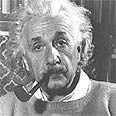
100th anniversary of the publication of his first paper on relativity. Einstein
Photo: Government Press Office
BERLIN - "Relatively Jewish. Albert Einstein – Jew, Zionist, Nonconformist" in Berlin’s Centrum Judaicum includes a strong educational aspect and has attracted a large number of visitors since its opening.
The exhibition, which consists of reproductions of letters, press cuttings and photos, is accompanied by German-English texts. A short film also shows fragments of Einstein’s speeches and travels.
The Einstein Year 2005 marks the 50th anniversary of the physicist's death and the 100th anniversary of the publication of the first paper on the special theory of relativity.
Rooted in Judaism
Albert Einstein referred to himself as "non-denominational," although he had a religious phase during his youth.
While he dismissed the idea of a personal God, Einstein remained socially and culturally rooted in Judaism throughout his life.
Confronted with the extent of anti-Semitism in Germany, he believed he had a shared destiny with the whole Jewish community.
Having left Germany for the United States in 1932, Einstein assisted many victims of Nazi persecution in the following years.
When he learned about the extent of the genocide of Europe's Jews in 1945, he was so appalled that he never set foot on German soil again.
Towards the end of his life Einstein described his relationship to the Jewish people as being the "strongest human bond" he had ever experienced.
Support for Zionism
The cultural and political aspects of Judaism were more important to Einstein than the religious ones.
Thus much is made of Einstein's "conversion" to Zionism and his support for its leaders from WWI onwards.
He was committed to a peaceful settlement of Jewish and Arab interests in Palestine and until the creation of the state of Israel in 1948, Einstein advocated a bi-national solution in the region.
There is also a fascinating correspondence with Israel's then ambassador in Washington, Abba Eban, who was charged with asking Einstein whether he would accept the Israeli presidency after Chaim Weizmann’s death in 1952.
Einstein refused this offer, saying that he lacked “the natural aptitude and the experience to deal properly with people and to exercise official functions.”
The exhibition includes several educative displays for younger people, but these are eclipsed by the great tale that is told here.
The exhibition runs until May 6 and again from 1-30 September 2005. Centrum Judaicum - Neue Synagogue, Oranienburger Strasse 28-30, Berlin. Sun-Thurs 10:00- 18:00, Fri 10:00-14:00
Albert Einstein, Centrum Judaicum, Exhibition, Zionism
http://www.einsteinjahr.de/index.php?id=111
- Published by arrangement with European Jewish Press, a pan-European news agency based in Belgium















